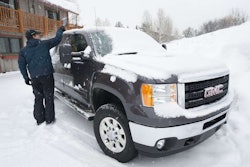 STACKED DECK
STACKED DECK
Keep an eye on the salesman if you want a winning hand when buying your next pickups; dealer-installed upgrades might not be your best bet
By Robin Walton
A good number of car owners drive their rides in stock mode just as they came from the factory.
Any aftermarket parts are simply replacements for wear items such as brakes and tires, or the basic necessities of a work truck such as a toolbox and bedliner.
Pickup owners, however, are much more likely to modify their vehicles for business or recreational use, adding winches, lights and gooseneck hitches before the truck does its first day of work.
These upgrades can be parts that you buy and have your company mechanic install or install yourself.
Aftermarket pickup accessories and equipment can also be ordered through, and installed by, a local upfitter. Or, as a number of companies are doing with new truck purchases, have the accessories installed through the pickup dealer’s network, which saves time on shopping and installation.
Automakers distinguish between “factory installed” options and the “dealer installed” accessory programs to sell that brand’s parts; Ford refers to their aftermarket parts program as Genuine Ford Accessories; the GM term is Genuine GM Parts; and the Chrysler system markets under the Mopar name.
Then there’re the accessories the dealer installs that don’t carry the vehicle manufacturer’s brand name.
While there is nothing wrong with the idea of dealers selling aftermarket parts so their customers can customize their vehicles before they drive off the lot, the reality of how it plays out in some dealerships can leave you with a bad taste in your mouth and a big hole in your wallet.
MONEY MAKERS
 Dealer-installed accessories and equipment can add up quickly.
Dealer-installed accessories and equipment can add up quickly.
The closing hours of some vehicle transactions take on a circus sideshow feel with all kinds of sleight-of-hand tricks and last minute maneuvers to try to blindside the unprepared customer.
Much of the latter is related to the sale of accessories, which is a profit honey-hole for car dealers.
Dealer-installed upgrades that have a big profit margin include:
|
|
There’s nothing wrong with wanting to have some of these parts on your vehicle. After all, aftermarket makes up lot of our talk here at ProPickup.
But you should question whether or not the dealership is the best place to get these, and whether or not the point of sale is the best time to make that decision.
Before you sign the sales contract, ask yourself this: Why here? Why now?
 Salesmen are there to make money off the transaction. It’s up to you to make the smart choices.
Salesmen are there to make money off the transaction. It’s up to you to make the smart choices.
Think about it. The dealer is in business to make money – and there’s no better profit margin than selling “dealer-installed” aftermarket parts on a new truck.
(Did you know some popular parts frequently sold during a vehicle sale can cost two or three times more than what a buyer would pay if they bought them from a local upfitter?)
To avoid this type of overpayment, do your homework ahead of time. If money matters then go in to your fleet sales person with a “build list” and what it would cost to do it yourself and compare prices.
If you know what it would cost to upfit your pickups after purchase, you will be much less likely to have buyer’s remorse.
CUSTOMER SATISFACTION
Of course not all dealerships are out to back you into a corner or blindside you in a way that will make you feel financially beat up.
As the general sales manager for Gary Yeomans Ford in Daytona Beach, Florida, Joe Sarro helped rank his dealership among the leading providers of Ford accessories.
“We take our customer satisfaction index very seriously, and that’s one of the reasons why we pitch Ford accessories,” said Sarro. “It provides a convenience for the customer. It saves them from running around town trying to find parts, and if they have problems with a product, they’re protected by the manufacturer’s warranty.”
Ok, that sounds customer motivated. However, another Ford sales manager, John McLellan, said, “anything that we can do to keep the customers at the dealership for their vehicle personalization needs is going to increase our profits.” Customer-motivated?
Some of the dealer-installed options that seem to have no purpose other than to improve the bottom line for the dealership include protective upholstery treatments, paint sealants, underbody coatings and etched glass for security purposes.
These are all items that have questionable value when compared to the prices that dealerships charge for the services and products that are being used.
It’s something that’s easy to see when you compare even the best quality of products that are available off the shelf to protect the car’s interior, exterior and undercarriage with simple do-it-yourself kits.
YOU CALL THE SHOTS
A common ploy of sneaky dealers is to spring an upgrade or add-on in an offer at the last minute. Often it takes the form of “by the way, this truck already has an alarm installed.” It’s amazing how often these upgrades slip the mind of car sales staff until it’s a gee-shucks moment at the close.
Do your homework and find out which dealerships have the best reputation when it comes to completing the vehicle sales transaction.
Remember, you are the one who’s coming in with tens of thousands of dollars. You’re the customer calling the shots as long as you come in prepared, calm, cool, collected and ready to walk if the prices don’t add up right. – Robin Walton








